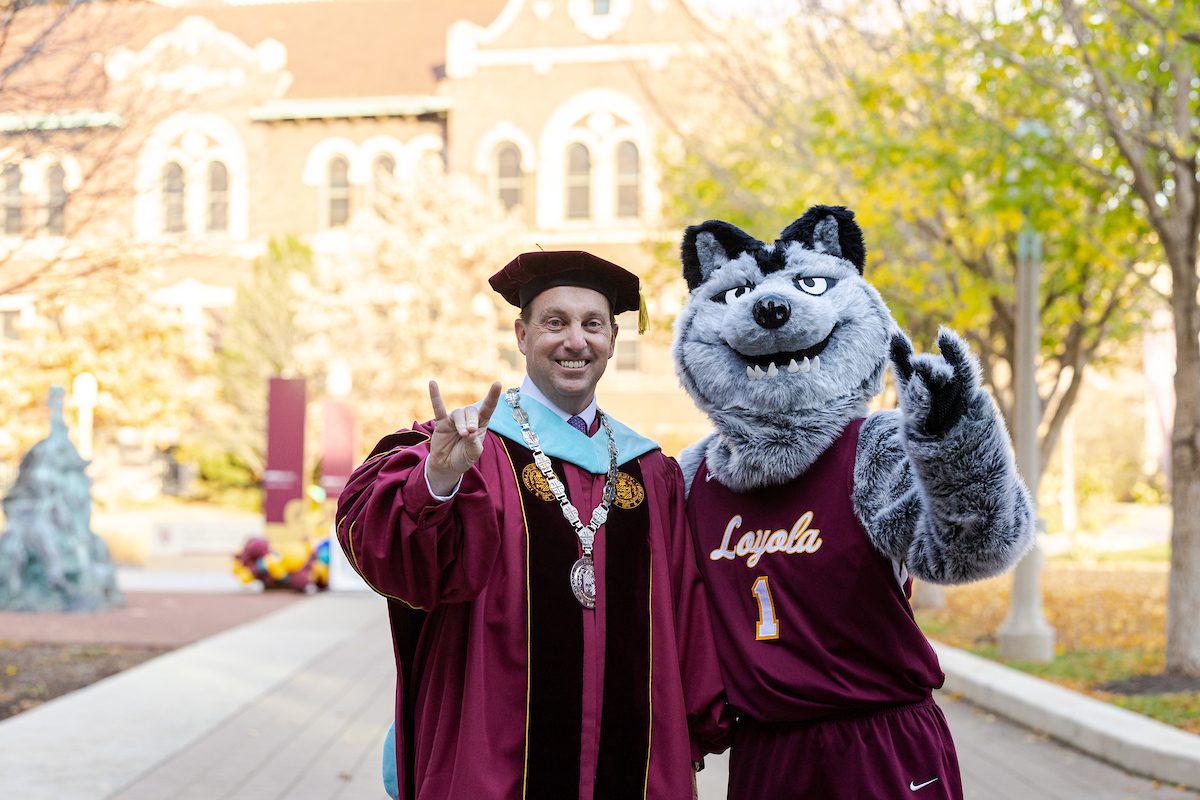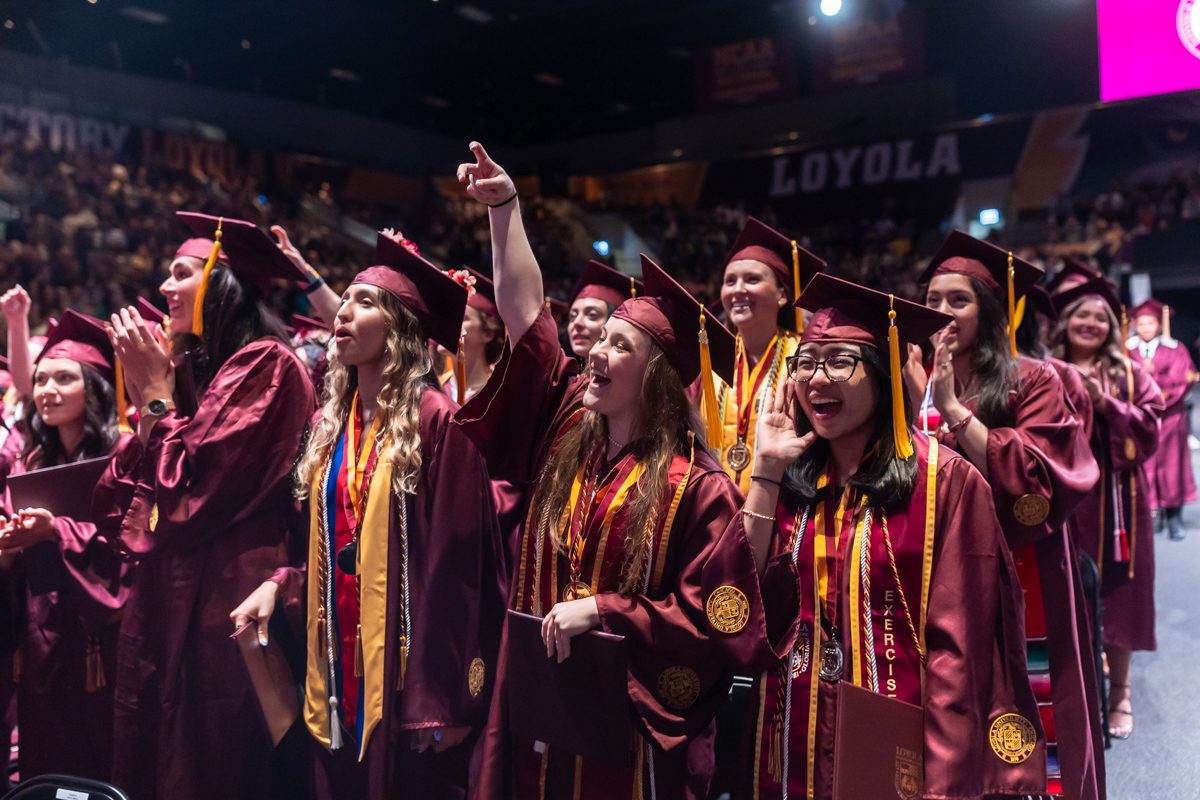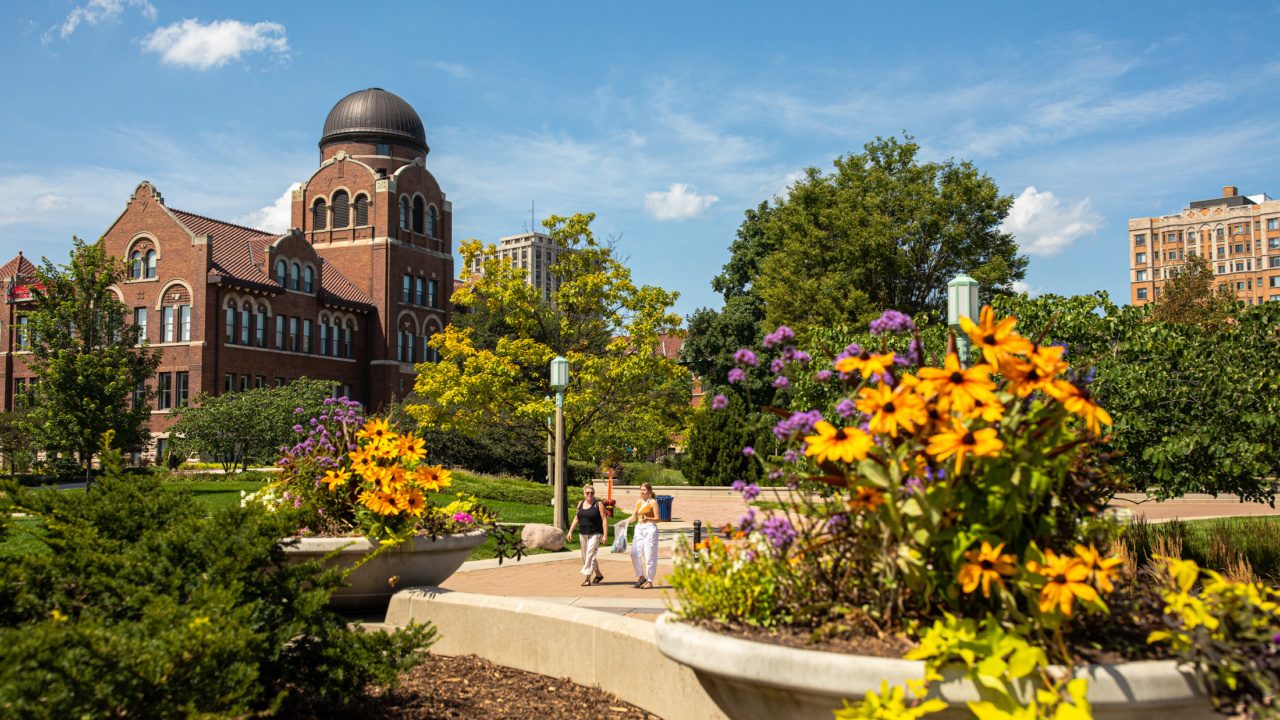President’s report: Mark C. Reed brings extensive leadership experience

Last summer, as President Mark C. Reed addressed a gathering of Jesuit university leaders at Loyola University Chicago, he was struck by the resonance of the moment.
Almost 20 years prior, Reed had attended the same conference, organized by the Association of Jesuit Colleges and Universities (AJCU). He had listened to Loyola’s 23rd president, Michael J. Garanzini, S.J., talk about what Jesuit higher education can accomplish for both students and communities. Now, he was speaking to these emerging AJCU leaders as the 25th president of Loyola.
“I recalled how inspired I was by Father Garanzini’s talk, and now I had the opportunity to relate what I know about the possibilities of Jesuit education and maybe a bit about my experience of how those possibilities can be realized.”
As Loyola’s chief executive, Reed brings an energetic, outgoing style to the pursuit of the possibilities. With decades of success as an educator, university president, and nationally engaged leader in higher education, his experience and accomplishments are influenced as well by a lifetime in Jesuit education.
His first year at Loyola has seen a packed schedule of outreach and robust discussion: meetings with senior leaders, board members, faculty, staff, and students, commencements, awards ceremonies, athletic contests, service days, and memorial events. He has gathered with Faculty Council, University Senate, Staff Council, Student Government, and the editors of the student newspaper. He has hosted receptions and town halls and has made a point to distribute his time at each of Loyola’s three Chicagoland campuses. When he traveled to Italy to visit the John Felice Rome Center, he was privileged to meet with Father Arturo M. Sosa, S.J., Superior General of the Society of Jesus. He has met or spent time with Cardinal Blase J. Cupich, Loyola’s congressional and state legislative delegations, and the presidents of all the city’s major universities.
He finds time to stop regularly to visit with Sister Jean in her campus office. During her 104th birthday week in August, he took her to lunch and accompanied her when she threw out the first pitch at Wrigley Field. He relates the story of their first meeting, during which he says Sister Jean presented him with a list of “Questions and Thoughts to Ponder.” Most of the 19-points were suggestions on interacting with constituencies in the University community. “Be yourself” was No. 1, followed by “Make yourself known as president of Loyola among faculty, staff, and students.”
By personality and professional practice, Reed is a connector. In his first year, he has worked his way through Sister Jean’s list. He has spent considerable time reaching out to people inside and outside of Loyola to move the University forward.
“We have a strong senior leadership team,” he says, “I try to focus on those things a president is in the best position to impact. Chief among those is bringing the right people to the table to collaborate, to solve problems, and to achieve. It’s bringing deans, faculty, staff and students together around a project. It’s strengthening partnerships externally with civic leaders, donors, and allies.”
Connecting the right pieces is something he anticipates doing more of as Loyola identifies strategic priorities and moves toward a comprehensive campaign to drive investments in Loyola’s future. During his meetings and travels he readily shares his ambition to build on the University’s excellence and continue Loyola’s rise as a global leader in higher education.
Well-rounded leader
Reed’s experience includes teaching, advising, and multiple roles across university administration. As president he’s intently focused on the quality of student experiences and outcomes and the educational needs of new generations.
Reed empathizes with college students who arrive undecided about their major and career because that was his path. A presidential scholar and honors program student in college, he ultimately studied mathematics and considered pursuing law school or management consulting. However, he always felt a pull towards education and spent a year teaching in the Alumni Service Corps at his alma mater, St. Joseph’s Prep in Philadelphia. That led to teaching, coaching, and administration at Xaverian Brothers High School near Boston. While there he earned a master’s degree at Boston College but felt he needed more education to be an effective school leader.
“Father Aloysius Kelley, S.J., then president of Fairfield University and one of the most important people and mentors in my life, remarked that as a university president with a PhD in classics he often wished he had an MBA or law degree,” Reed says. When an opportunity to work at Fairfield as assistant dean in the business school opened, Reed jumped at it, earning his MBA and beginning a consistent practice of teaching undergraduate and graduate calculus and statistics courses in addition to his administrative leadership roles.
During 15 years at Fairfield, Reed served as dean of students, vice president for student affairs, interim vice president for university advancement, and senior vice president for administration and chief of staff. He completed doctoral studies at the University of Pennsylvania with a cohort of university leaders from across the country who represented a range of colleges and universities. Reed shares, “I am indebted to Father Jeffrey von Arx, S.J., who succeeded Father Kelley. I worked for and with him for more than 12 years. He believed in me, promoted me, and taught me so much. All of this, plus my studies at Penn and completing a dissertation, were important experiences that I rely upon to this day.”
Reed does not recall exactly when he thought about the possibility of being a university president, but he noted that the Jesuits consistently call upon lay leaders to step forward and support their formation and development. He also credits colleagues from whom he gained valuable perspective and who he says were willing to put up with his many questions to better understand their work.
In 2015, Reed became the 28th president of Saint Joseph’s University, the first non-Jesuit to serve in the position. He initiated a strategic plan centered on the expansion of the academic program, which resulted in the internal launch of the School of Education and Health Sciences; and the external acquisition of the former University of the Sciences, bringing additional depth in the natural sciences and new programs in pharmacy, occupational therapy, physical therapy, and physician assistants.
During his tenure, a comprehensive master plan was developed and begun and the public phase of the university’s largest capital campaign was launched with an historic $50 million leadership gift. The university endowment more than doubled, and the campus footprint expanded. Reed increased the university’s emphasis on diversity, equity, and inclusion through the expansion of physical space, staffing, and programming, as well as increasing the percentage of students of color. Reed’s appointment at Loyola, said Saint Joseph’s board chair Jim Norris, was “recognition that the broader Jesuit university community has seen the transformation at Saint Joseph’s under Mark’s leadership.”
First year and forward
“Loyola is in excellent shape,” Reed says. “Our fundamentals are strong, but more importantly, the intellectual culture is passionate and ambitious, yet caring. The faculty encompasses a healthy blend of generations and perspectives and high-quality scholarship along with great teaching.”
“I thought in coming to a Research 2 university there might be more distance between faculty and students,” Reed says. “That is not the case. Loyola has been able to grow research capacity and extend its reputation internationally while maintaining that small-school intimacy.”
Reed notes that Loyola has recruited record undergraduate enrollments in recent years. “Classes are more talented and more diverse every year, and we have made substantial strides over the past few years diversifying our faculty and student body. We are creating spaces for interdisciplinary inquiry and service that are integral parts of a Jesuit education.”
Loyola’s academic enterprise is strong and vibrant in an era when the value of higher education is being called into question. Loyola’s core mission is more essential than ever, Reed believes. “It’s still clear that collegiate and professional education offer the most reliable paths to generational advancement,” he says. “The need for greater social and economic mobility, for educated and engaged citizens, and for reasoned civil discourse is more apparent than ever.”
Loyola’s finances are strong, with healthy operating surpluses for the past two decades, low debt levels, and strong bond ratings. Loyola’s endowment topped $1 billion last year for the first time in history. Years of favorable operating results and diligent and thoughtful financial planning for the future puts Loyola in an enviable position as priorities are identified for a forthcoming comprehensive capital campaign. “We are poised to think boldly about how to raise our profile and stature as an international leader in Jesuit higher education,” Reed says.
The recent Supreme Court ruling regarding race-based affirmative action in college and university admissions has not impacted Loyola’s unwavering commitment to diversity as an educational value and moral imperative. “Loyola was founded to serve the children of immigrants, first-generation college students whose opportunities were precluded elsewhere,” Reed says. “We remain as committed as ever to assuring that students from all backgrounds have access to opportunities to advance their lives and careers.”
“We are poised to take our place as an international leader in Jesuit higher education and among doctoral universities.”
— Mark C. Reed, PhD , Loyola University Chicago
Excellence with purpose
Reed’s experience of Jesuit education in his own life lends a fundamental personal energy to his leadership style. “I am a strong advocate for Jesuit education because I have experienced it throughout my life,” he says.
In meetings with faculty, staff, students, and alumni, he grows animated talking about Loyola’s strengths and opportunities.
Loyola’s College of Arts and Sciences is home to an esteemed liberal arts education “that remains at the center of what we do to educate new generations of critical thinkers and informed, engaged citizens,” he told a town hall audience in September. “The Quinlan School of Business is home to the most highly regarded undergraduate business degrees in the region.” He points out that the Stritch School of Medicine conducts world-class basic and clinical research and often partners in those projects with Chicago’s R1 institutions.
Reed views units like the Parkinson School of Health Sciences and Public Health and the Institute for Racial Justice as hubs for interdisciplinary research and education around urgent social issues, and the School of Environmental Sustainability has emerged as a leader in incorporating sustainability throughout many fields.
He finds special strength in Loyola’s Jesuit community. “One of the most distinctive aspects of Loyola is the way Jesuit principles and practices are woven through the curriculum and culture,” he says. “I believe this is due to the substantial presence of Jesuits on our campuses compared to others. Jesuits in formation want to come to Chicago, and I believe Loyola can become the premier international destination for Jesuit formation and advanced Jesuit studies.”
Looking forward, Reed says, “My main objective as president is to inspire Loyola to pursue excellence in all its endeavors. In this spirit, we must thoughtfully and intentionally scale up our research capacity as an R2 university, prioritizing areas where we are strong, to attract top faculty and students interested in a rigorous experiential education.”
To this he adds a point he has emphasized often during his first year at Loyola: “Our pursuit of academic excellence is not an end in itself. We pursue excellence not for pride or ego, but for purpose: to do more and become more, not for ourselves alone, but for the greater glory of God and in service to our fellow travelers on this earth.”


